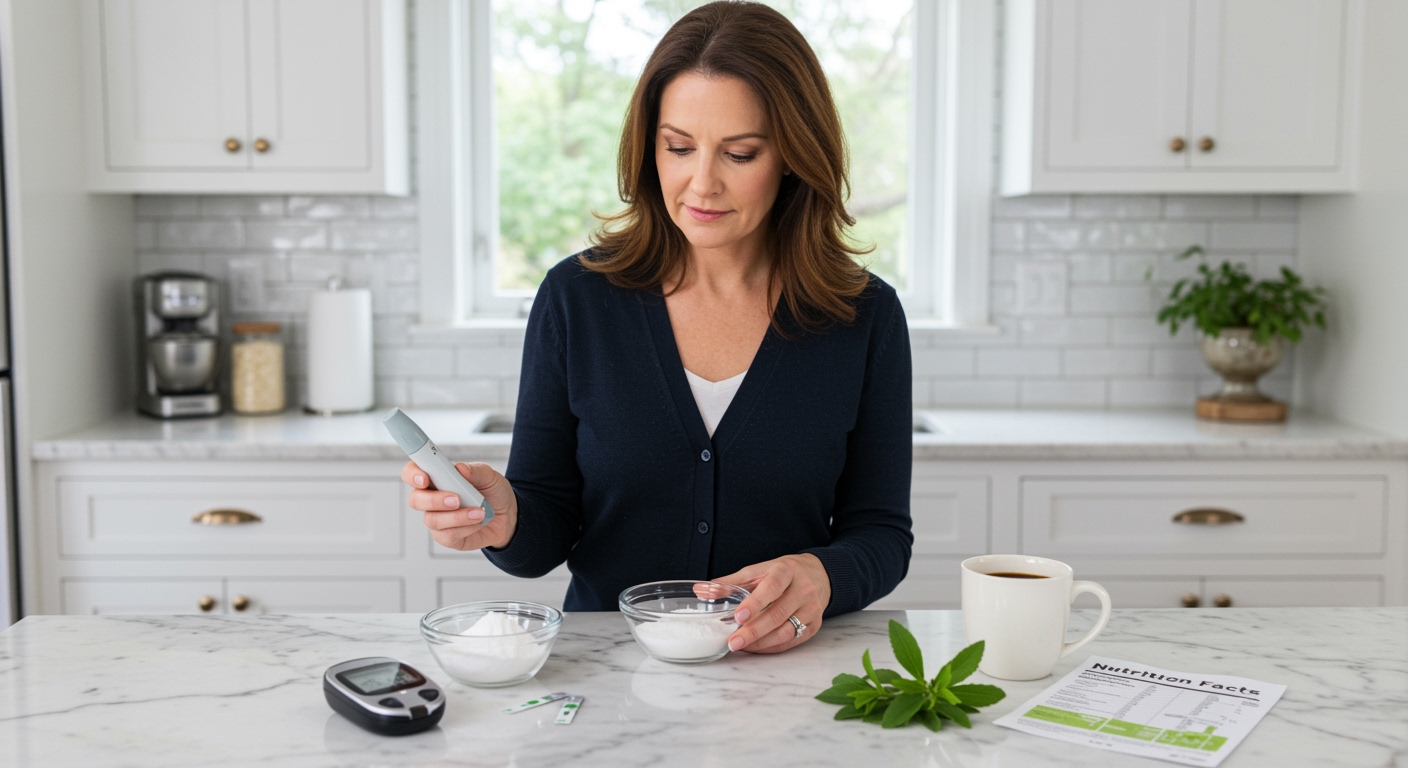✪ Key Takeaway: Stevia is generally safe for diabetes as it does not raise blood sugar levels, but individual responses may vary.
Introduction
You reach for that packet of stevia in your coffee, confident it will not spike your blood sugar.
But then you wonder if this natural sweetener is truly as safe as everyone claims, especially when managing diabetes requires such careful attention to every food choice.
Hi, I am Abdur, your nutrition coach, and today I am going to explain everything you need to know about stevia and diabetes, including how it affects your blood sugar and what the latest research reveals.
How Does Stevia Actually Affect Blood Sugar?
Stevia contains zero calories and does not contain any carbohydrates that your body can digest.
The sweet compounds in stevia, called steviol glycosides, pass through your digestive system without being broken down into glucose.
Your pancreas does not need to produce insulin in response to stevia consumption because your blood sugar levels remain stable.
Multiple studies have shown that stevia has a glycemic index of zero, meaning it causes no measurable increase in blood glucose levels.
This makes stevia fundamentally different from regular sugar, which rapidly enters your bloodstream and causes significant blood sugar spikes.
Research published in regulatory toxicology journals confirms that even large amounts of stevia do not affect glucose metabolism in healthy individuals or those with diabetes.
✪ Fact: Stevia is 200-300 times sweeter than sugar, so you need only tiny amounts to achieve the same sweetness level.
What Are The Potential Benefits For Diabetics?
Stevia offers several advantages beyond just avoiding blood sugar spikes.
Some research suggests that stevia may actually help improve insulin sensitivity over time, though more human studies are needed to confirm this effect.
The antioxidant properties of stevia compounds may provide additional protective benefits for people with diabetes, who often face increased oxidative stress.
Using stevia instead of sugar can significantly reduce your total calorie intake, which supports weight management goals that are crucial for diabetes control.
Weight loss of even 5-10% can dramatically improve blood sugar control and reduce the need for diabetes medications in many people.
Stevia also does not contribute to tooth decay like regular sugar does, protecting your oral health which is particularly important for diabetics who face higher risks of gum disease.
✪ Pro Tip: Start with smaller amounts of stevia and gradually increase to find your preferred sweetness level without overwhelming your taste buds.
Are There Any Risks Or Side Effects To Consider?
Most people tolerate stevia very well, but some individuals may experience digestive issues when consuming large amounts.
The most common side effects include mild bloating or stomach discomfort, particularly with highly processed stevia products that contain additional ingredients.
Some people report a slight bitter aftertaste with certain stevia products, which varies depending on the processing method and purity of the extract.
If you take blood pressure medications, monitor your levels carefully when first using stevia, as some studies suggest it may have mild blood pressure lowering effects.
Always check the ingredient list on stevia products because some contain added sugars, artificial sweeteners, or bulking agents that could affect your blood sugar.
Pure stevia leaf extract is generally the safest option, while highly processed stevia blends may contain unwanted additives.
✪ Note: Always consult your healthcare provider before making significant changes to your diet, especially if you take diabetes medications.
How Should Diabetics Use Stevia Safely?
Start by testing your individual response to stevia by monitoring your blood sugar levels before and after consumption.
Choose pure stevia products without added sugars, maltodextrin, or other ingredients that could affect your glucose levels.
Use stevia as part of a balanced diet rather than relying on it to justify consuming large amounts of sweet foods or beverages.
Remember that stevia works best when you gradually reduce your overall preference for intensely sweet flavors over time.
Consider rotating between stevia and other natural, low-glycemic sweeteners to avoid developing taste fatigue or potential sensitivities.
Keep track of how different stevia products affect your appetite and cravings, as some people find that artificial sweetness can trigger hunger for more sweet foods.
✪ Pro Tip: Mix stevia with small amounts of natural flavors like vanilla or cinnamon to enhance taste without adding calories or carbs.
The Bottom Line
Stevia is generally safe and beneficial for people with diabetes because it does not raise blood sugar levels and contains zero calories.
The best sweetener is the one that helps you maintain stable blood sugar while enjoying your food, and stevia can be an excellent tool in your diabetes management strategy when used wisely.
I would love to hear about your experience with stevia or any questions you might have about managing diabetes through nutrition, so please share your thoughts in the comments below.
References
At NutritionCrown, we use quality and credible sources to ensure our content is accurate and trustworthy. Below are the sources referenced in creating this article:
- PubMed: Stevia and Blood Sugar Research
- PMC: Stevia Safety and Efficacy Study
- Medical News Today: Stevia and Diabetes Guide
- GoodRx: Does Stevia Raise Blood Sugar





